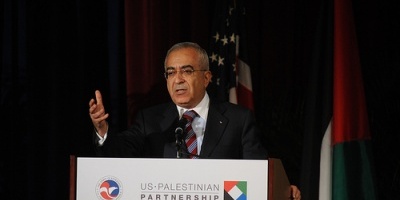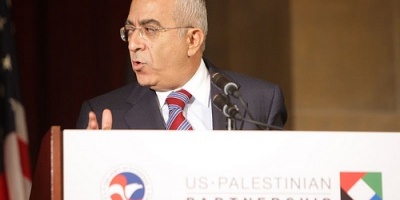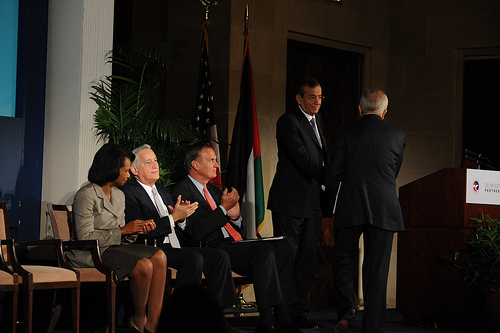October 14, 2008
Thank you very much. Thank you Ziad for the kind, warm introduction. Madame Secretary, Ladies and Gentlemen, Good Morning to all of you. It is indeed a great honor for me to share the stage with someone I truly respect, admire and to whom I am deeply grateful, and the Palestinian people are grateful for the great effort she has been making and the leadership she’s been demonstrating in trying to move the cause of peace in the region forward.

This is an opportunity indeed for me to thank you for all of that, for the tireless efforts, energy with which you approach this task, something which we all know is not easy, but we all share the firm belief that it is indeed doable, and if it is, it will be in large part due to your leadership, to the vision of President Bush, whose leadership, vision, your own tireless contribution. We have now and we have had now for a few years a concept of a solution that has become an international consensus.
You know people tended over the years to take this for granted. I don’t think it should be, to have a concept for a solution that has become a matter of international consensus is a very important contribution that has been made, and I again thank you very much for your efforts in making that possible. But also, in helping move the process forward. To give meaningfully and operational content to that concept, to give people around the world, especially in the region a sense of possibility about it. With all of its components, in regards to what needs to be done for this thing to work out. What it is the various, the key principles have to do, beginning with us Palestinians, but also the Israelis, with the help and support of the international community with the United States leadership. These are the basic key ingredients, and in fact I view what we are all doing together as an important element and strategy to get us there, to get us indeed to the point to end the occupation that began in 1967, and something that will lead to the emergence of a independent viable Palestinian state living side by side in peace and security and harmony with all of its neighbors and the region including Israel. That’s what this is about.
It is also an opportunity for us to celebrate the power of partnership. Public-private partnership, American-Palestinian partnership, all driven by the very strong power of business. Putting all of those elements together in a way to make this possible. I’m grateful to our host the US Chamber of Commerce, as indeed I am to Aspen Institute, to the men and women who made this possible, in this room, those who are not able to make it but who have been with us from the beginning in this arduous task of putting together the elements of success that are capable indeed, I do believe, of getting us to where we all are going. An opportunity indeed for us to celebrate this enormous driver, the power of business, put in a context of this partnership, the American-Palestinian Partnership, which together with other elements of our whole overall economic strategy, I’m happy to tell you, is beginning to yield dividends, to yield gains that are visible on the ground that are felt by our people. So this is something else that I really wanted to tell you. That we are now beginning to witness positive facts on the ground, positive facts that change anyway that reinforces us in the belief that we are indeed on the right track. You know, when we get there, we get there. We really should strive to do this as soon as we possibly can, in terms of the overall political objectives of this process. But what is absolutely essential is for us to ensure that we are on the right path. That each of these principles to this is doing their best actually to make this work, starting with us Palestinians. I’ve always believed what we can do in order to promote our chances, indeed of getting there, of enjoying that which is indeed a right for all the peoples around the world to live as free people in a country of our own. That’s what this is about, and this is definitely a very strong motive, a very strong cause to rally people around to get them to understand what Palestinians actually do, what we do together is important.
It’s key to position ourselves on a path where we can indeed take advantage of the enormous depth of good will displayed by the International community, including especially by the United States, indeed helping us get there. It has always been my belief that unless we position ourselves on that path where we can take advantage of this good will, offer to help and also in the context of what business to business can do. I can tell you that given my background, it is something that I attach a great deal of importance to, this business to business interaction.
That’s what’s really going to be able to, I believe, capable of providing the result that we want: sustainable development. What governments can do is absolutely important to get us to a point where we can move the process forward. But economically, economic recovery cannot be sustained on the strengths of government intervention. It is necessary to put the elements together, and once again I am grateful to Secretary Rice for the efforts she has made, the leadership actually, in order to put all of these elements together , to get us really started on this path, something that I believe, with other elements of our economic strategy is capable of getting us there.
The point of sustainable development, is itself very important, there’s no question about that, is not a substitute for the hard work that needs to be done or the effort that has be to exerted on the political side of things. Important as economic development might be, and it is, it is not a substitute for the hard work and the effort that has be to exerted politically to get us, as I’ve said repeatedly on a number of occasions, This is not an economic conflict, requiring economic intervention. It is a political conflict that requires a political intervention. But these two paths are important, and the effort has to be pursued on both tracks in parallel time. They’re mutually reinforcing, causality does not flow one way- it flows from one track to the other, enforcing each other, if the process is managed well.
I’m happy to tell you that with we’ve been able to do, with your help and support, the support of this administration on the official side of things, but also intervention in promoting conditions necessary to get the private sector to be interested. I feel that we are on the right path. The United States has been, actually a generous provider of assistance to us. As the Secretary mentioned to you, the United States actually transferred $150 million to us in March of this year, most significantly directly to us, and the United States is about to transfer another $150 million in budgetary support to us in the same way. I cannot tell you how proud we are as Palestinians to be recipients of this kind of assistance extended to us this way, because what this does is, and the Secretary was obviously right in recognizing the important role of Congress in all of this, this was possible on the strength of what we Palestinians have been able to do in building up and putting together a public finance system with integrity that made it possible for the US administration to indeed make that transfer, with Congress indeed satisfied that all the safeguards are there.
That we Palestinians have been able to put together a public finance system that measures up to the highest international standards and practices. Think about this, think about how powerful of a message this is and what this is about, and how connected and how deeply connected this is to the cause that this is all about: ending that occupation, freedom for our people, security for all- Palestinians, Israelis and all, stability for the region- how important this is for the whole world community. But it all begins in what we can do ourselves with your help and assistance. It is extremely important. That’s the kind of self responsibility that we try to promote. That is why, quite frankly, more than anything else, ladies and gentlemen, I feel that we are on the right path. And we indeed do have some good stories to report to you. And I hope in the course of what you are going to be able to do today, you’re going to explore more investment opportunities, and this is going to lead to more business opportunities, actual business opportunities on the ground.

Palestine is indeed open for business. That was the key message of the Palestine investment conference. That conference was about that, to make a statement of that kind, but it was also intended to send a strong signal of our determination, the determination of the Palestinian people to actually get that job done. That we indeed can do things. That we are able to get to where we’re going by defeating that sense of defeatism that decades of occupation have precipitated. Armed with the strength of conviction that we indeed can get there, is key to our ability to get there. That’s what the Bethlehem conference was all about. It was a statement. It told the world and our people that there is positive change on the ground. Palestine investment Conference would not have been possible a few months earlier. It became possible because of the substantial improvement in security conditions and law and order that made that possible.
That dinner for more than 1,000 people in the open air, which Secretary Rice spoke of, would not have been possible in the way that it happened a few months earlier. It all became possible because of the enormous improvement of the conditions on the ground, something that I’m happy to report to you is how that is happening throughout the land. You know, we said we were going to do this earlier on because we always felt that security was the most important service that any responsible government can provide to its people. And we’re doing it. It looked impossible; not many people gave us a chance. The odds were not really that great. Many years of decaying, indeed disintegration. It is not only that we have been able to actually to do this and deliver but what came with that in the sense of responsibility. If we are able to do this, we are able to do anything: that’s the real message. And that, more than anything else, is what’s going to continue and keep Palestine open for business.
What we declared in Bethlehem, you know, is still true today, and I hope that in what you, ladies and gentlemen do together: you’re going to promote that, you’re going to add to that drive, to get us to that point that we’re going. All of what you’re doing is an important element of that overall strategy- economic strategy, political strategy-Security- everything is related to everything else. But in the broader scheme of things, I can tell you that a few things are working out. Some of these success stories that we’ve been talking about repeatedly, because they are truly are inspiring; difficulties and all. You know the story by now- the one that I’ve been talking about at many occasions, that pharmaceutical company that was able, actually, to make a shipment of pharmaceutical products to Germany for the first time ever, meeting in the process the most exacting standards in the industry. It’s happening in Palestine today. You know, that export to Germany, what it really means is that the market is open to the entire European Union. Think of the agricultural business able to export for the first time. It’s produced in the United States directly, with Palestinian certificate of origin for the first time. These are important success stories and they are adding up. They are adding up to the whole that is transforming economic life in a significant way. The numbers do not yet show that, but they will. There are lags for important reasons. Recessions and economic conditions have been with us for a very long time. But I think eventually, you are going to begin to see that in actual data describing what’s happened on the national account side of things.
This is a record year as far as tourism is concerned in Bethlehem. We’re going to succeed, and I’m happy we have here Willis here, our Minister of Tourism as well as Minister of Economy and officials, but I’m especially pleased to have a group of businessmen and women from Palestine with us today. That’s how we’ll be able to sustain it. This is also another success story. What the Secretary has said about Bethlehem, it used to be like, is what it’s like today. That brings job and it brings jobs and reinforces that sense of possibility. I cannot tell you how important this is- that defeatism that we have to defeat first, in order for us to be able to get to where we’re going. All of this is happening on the strength of government intervention that made it possible for us to actually pay down our debt to the private sector. That’s why we were able to create the jobs. We were able to do so, with your assistance, your assistance extended to us by the United States and other parts of the international community for sure. And I’m here to tell you, consistent with the sense of self responsibility that I’ve been talking about all along.
I’m happy to tell you that indeed while our need for that kind of assistance remains and it will still be substantial in 2009, it is going to be substantially less than it has been in 2008. On the strength of measures we’ve been taking, both on the expenditure side and on the side of budget. That’s what self responsibility is all about. So doing what we have to do, implementing a very large number of projects, committed to development programs, through a grant, intended to be a response to people’s needs around the country- in refugee camps, in rural areas- throughout. These are projects that are conceived as a consequence of people telling us what they need. They are very responsive and provide a critical service and also help create jobs. All of this will no doubt also contribute to gaining us a little time to the point that we’re going to be able to implement bigger infrastructure programs, that are no doubt going to make things much better for our people in terms of the capacity of the PA to deliver services effectively.
All of this is important, but what’s going to sustain all of this is the power of business. All of this is really going to get us to that plateau, where the economy is able to ride that bike on its own. But that’s the power of business. That’s where you come in. That’s why there is a great deal of importance on what you’re doing. We’ve been able to do this so far, largely in the West Bank, but we look forward to the day that we’ll be able to do this in Gaza, for Gaza is, and will always be an integral part of our homeland in the making. There’s no question about that. We are able to do this today in the West Bank, and as I told you, indications are that the economy is moving. I gave you some example of success stories but I can tell you that also unemployment is beginning to trend downward in a significant way. And where it is today, in the West Bank, while still high, is substantially less than any level or rate that it has been at since late 2000. All of this happened in the course of the past year as a consequence of this economic strategy which I think is coherent, and has all of the elements to make it and really take us to where we’re going.

So ladies and gentlemen, thank you very much for being here, thank you for all the effort you have been making. I know by being here it is one thing to do this, this does, no question about it, reflect a measure of good will toward the region and toward the cause of peace. But I am here to tell you that it is also good from a business point of view. And I want you to tell your friends outside of this room about it. Tell them there are business opportunities to be made and those who get in today have a much better chance of getting in on the ground floor and go ahead. That’s really how we’re going to be able to move this. And make no mistake about this- I don’t want anyone to believe that is about anything but a strong effort to really help us to get where we’re going and to end that occupation and get us to have our state. This is not about making the occupation better. This is about ending it. That’s what this enterprise is about, ladies and gentlemen, thank you so very much for having be part of this session, it’s great to be here.
TAGS:
















